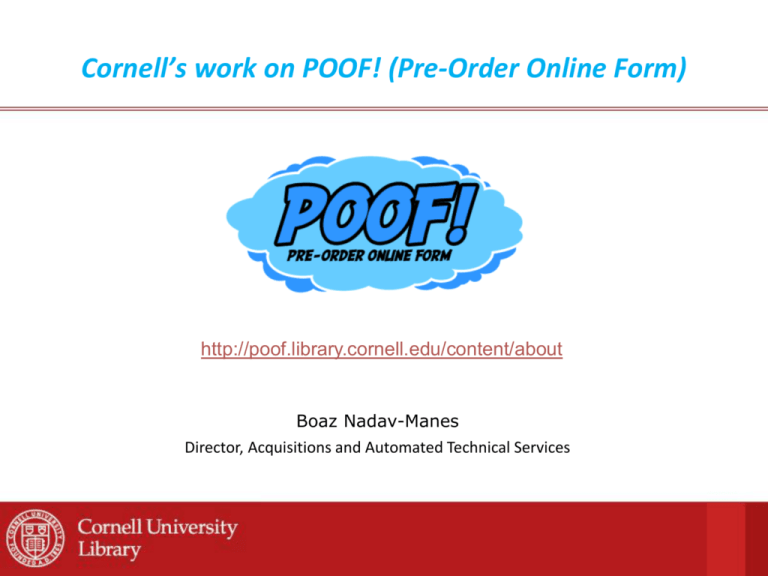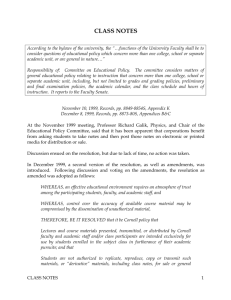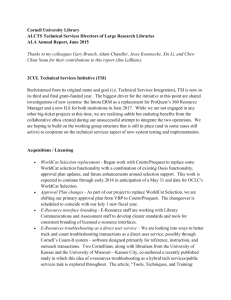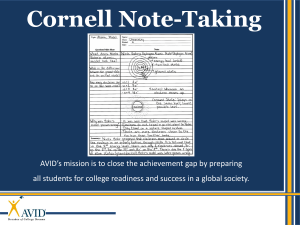Patron-Driven Acquisitions - eCommons@Cornell
advertisement

Cornell’s work on POOF! (Pre-Order Online Form) http://poof.library.cornell.edu/content/about Boaz Nadav-Manes Director, Acquisitions and Automated Technical Services What is Poof!? • POOF! is an online tool built with Drupal, • Uses queries that acquire bibliographic metadata from WorldCat or entered manually into the system. • Presents the data in a user friendly fashion. • Subject specialists at both Columbia and Cornell can review the bibliographical information and discover if an item is already held by the other 2CUL partner, • The specialist will be also able to reject or defer an item for additional review. • A preset matrix determines where the purchase will be made from (based on variables within the metadata associated with the material to be purchased.) • Various scripts enact the decisions in the appropriate system that will create the acquisitions record and purchase order in Voyager. • The tool provides avenues for subject specialists to interact across institutions with each other (and with contributing vendors) regarding the value of the items reviewed, ranking them in terms of their usefulness, and adding comments. Originally, it was meant to replace this… Keep in Mind POOF! CAN BE USED FOR OTHER PURPOSES POOF! broad outline POOF backend detailed Workflow: POOF Titles are selected Records loaded into WCS stream Records are matched in a matrix with vendors Scores, Documents, Visual material are kicked out and assigned vendor by specialists YES Is it a non-book format? NO Is there a matching vendor? NO Order specialists assign vendor and add fund, price and location taken from WCS records YES Is there an existing record in Voyager? YES Is it an exact duplicate? NO Pending POs are created MS Access reports identify notes which are added to line items POs approved and sent to vendors via EDIs or mailed to vendors NO YES Records are rejected and emails are sent to selectors Who are the users of POOF!? • • • • Subject specialists Library patrons (faculty, students, staff) Acquisitions processing staff Materials vendors So how does it work (the full view): On average the whole process takes no more than a few seconds per request! Step 1: enter (or copy-and-paste ) an ISBN, UPC (for DVDs or CDs), or OCLC number to search WorldCat for matching records and hit enter to receive a table of results. The multiple results reflect the different records which matched the OCLC ISBN search. Alternatively use Manual Data Entry –POOF! allows vendors to submit title offers directly to selectors using a manual entry option (and to override the OCLC search) by keying-in elements like: ISBN, title, author, place of publication, LC class, etc. The vendor can also add complementary notes to the offers. The vendor uses the “Forward” button to send the metadata to any POOF! users – the new titles will await the selector in their POOF! Inbox for ordering decisions. Step 2: Examine results and choose an adequate record – for example an electronic or print version of the title . Quite often selectors discover an electronic option that they were not aware of before. Cornell encourages selectors to pick the records with a call number… Continue to examine results - make sure that your library or a consortia don’t hold the item already by looking at the traffic lights (symbols reflect OCLC conventions). Green = no party has the item, Yellow = one party owns the item, Red = all parties own the item. Traffic light symbols can accommodate any preference an individual selector has. For example: choose to show Princeton and Yale instead of 2CUL. Hit the OCLC linked numbers if you would like to receive more title information: Step 3: choose the record that suits your order request and examine the automatically populated bibliographic long view to make sure all the details are correct It is not too late to make format adjustments – you can override the format designation by clicking on a different format. Step 4: Fill ordering information (location, fund, price) and add a requester as needed The note field facilitates communication between all POOF! participants: selectors, staff, and vendors. The records with the notes can be forwarded to any member across institutions at any time. Step 5: hit order – a confirmation message will appear Note that the Order button will be grayed out unless fund, location, and a price is added! The ordered item moves to an “Ordered” folder for further processing. You can also choose to defer or forward an item to another member. All the ordered items move to the “Exported folder” overnight. Items in the Inbox folder can be voted about by selectors or vendors for quick prioritization (for example: if a faculty participates in the selection process he/she can deem some titles as “awesome” or “poor” and forward them to the selector for fund allocation) Items in the Exported folder can be searched and traced back for reference All items have a transection history that records also the notes added at what date: Behind the scenes the POOF exported marc file is matched daily against built-in logic tables (MATRIX) that allow the automatic creation of pending purchase orders. The fund and vendor tables can be customized and loaded into production at any time by POOF! cross institutional administrators via Cornell’s LSTools: LSTools is used to initiate many of Cornell’s scripted jobs and allows non-specialists to fold complicated automation routines into their daily workflows. LSTools is also used to monitor POOF! activity and validity of tables and rules. At 8:30AM a script picks up a new POOF! file and runs it against the matrix. It is aimed to recognize specific elements in the marc records mostly taken from 260, the 008 and the Leader fields and matches them against a vendor Monographs Year of publication Chosen vendor Approval publishers It also recognizes different formats and channels the records to specific paths for additional processing. Ingesting the records into the LMS occurs differently across institutions. Cornell used Voyager’s bulk-load rules to automatically create pending orders while Columbia and Harvard use pearl scripts to do the same. Printed music Projected medium More than 90% of the records are automatically assigned to a vendor and do not need extra handling by Acquisitions staff! We can also guarantee a 24 hour turnaround time instead of 48 hours on average for a manually created purchase order! POOF! stats: June 2011 through June 2013 9576 Cornell items (2601 Columbia items – since November 2012) in the system 7834 Total POOF Bibs in Voyager 7188 POOF-related Line Items that have been invoiced and paid for. PIECE COUNT purchased on those Invoices: 7474 (because sometimes we order more than one copy) Number of pieces Acquired by FY: FY11: 192 FY12: 3566 FY13: 3716 (to 6/10/2013) Total Amount Spent: At least $524,564.69 (not counting items for which we ordered more than 3 copies) Number of E-BOOK Bib records with POOF 035s: 664 Exceptions of any kind (no country information, no vendor etc.) are moved to a specific folder and are called “kick-outs”. These records are funneled to specific folders according to vendors or formats These “Kick-out” records are kept in their MARC format and need to be imported manually into our system and verified against our existing records. Each of them still retains the WCS selection information provided like funds, notes etc. Location Vendor Price Manually entered records –the free text fields automatically converts into discoverable MARC and include fixed fields (like country of publication, date, and language) which together with purchasing information allows the creation of automatic purchase orders via a matrix Automation routines (enacted via LSTools) are used to do some quality control of the records (definite article, leader, country and year of publication) Future POOF! enhancements Already on our list: •Redirecting ILL unfulfilled order requests to selector’s Inbox for consideration and decision making. •Missing or lost items will be forwarded automatically to selectors’ new items queue. •Notifications of availability of alternate formats (electronic/print) of patron-driven order requests. •Refresh of deferred or pending requests against the WorldCat and Voyager data. •Using other library and vendor databases to retrieve additional (non OCLC) metadata •Control to configure preferences for showing/hiding fields will be managed at the individual institution. •Amazon.com routing in vendor matrix. •Create a sustainable governance team and a scalable business model. What do selectors say? “POOF has been a great time saver. It is so much more efficient to be able to track orders I have placed in POOF rather than sifting through email or copies of print orders to see this activity. The user interface is clean, quick and easy to use – it is very handy to be able to just put in an OCLC or ISBN to have the form populated. Using the OCLC number has also been great to pinpoint the exact edition wanted and is particularly helpful when placing orders for DVDs or other visual material. It has also been an efficient way for ordering new titles that haven’t made it to WorldCat Selection yet or are generally outside our profile. The ability to see Columbia holdings and the possibility of adding other libraries is another useful feature”. Maureen Morris (Anthropology and Native American History Selector) Fred Muratori (Bibliographer for English-language Literature, Theater & Film) Kaila Bussert (Visual Resources Outreach Librarian, General Social Sciences Selector) “As a CUL selector, I was very happy to see the library launch POOF! It is the easiest tool I have used for ordering known items for the collection. CUL has used WorldCat Selection for several years and it remains an essential tool for identifying and ordering books in the fields I cover; POOF! handles types of orders and facilitates varieties of collection development practice that WCS does not accommodate well. POOF! is fast and light-weight. It enables me to respond to patron purchase requests nearly effortlessly, and it allows me to work easily from online and paper publishers’ catalogs (something that I had almost stopped doing as our workflow shifted to WCS). For the past year or so, I have been working with colleagues at Princeton on coordinating our collection development activity in the area of German literary and cultural studies. A new feature in POOF! allows me to set the holdings display to show holdings for both Cornell and Princeton for every item that I search. At launch, the display showed holdings information for the 2CUL institutions, and I am very pleased that the POOF! team has now enabled selectors to customize this display to support various collaborations in which they are involved.” Kizer Walker, Director of Collection Development, Managing Editor, Signale: Modern German Letters, Cultures, and Thought (http://signale.cornell.edu/) “I see that I have exported 360 titles in POOF! That means that I account for 14% of the POOF! activity. As my use attests, it is working really well for me right now. “ Peter Hirtle, Senior Policy Advisor, Digital Scholarship and Preservation Services “I really like Poof!” Eric Acree, Director, John Henrik Clarke Africana Library “In general, POOF is very easy to use for online ordering and is a big advancement.” SOME HISTORY… Some history… On Friday, February 13th, 2004 the Integrated Tool for Selection and Ordering at Cornell University Library (ITSO CUL -- pronounced it's so cool) launched. An initiative by Collection Development to move away from the printed 3x5 cards supplied through the LC Alerts Service. At Ross Atkinson’s (AUL for Collections) request, David Block (Head, World Area Programs, IRIS) organized a team that also included Peter Hoyt of Library Systems and Howard Brentlinger of Collection Development. Their goal was to create a mechanism that would sort the appropriate MARC records to selectors based on their existing subject and area profiles. Based on ITSO CUL, WorldCat Selection, which debuted in December 2006 with Cornell staff as the first user, allows selectors of library materials to view new title data from multiple vendors in one central, comprehensive system. More history… By early 2009 almost half of the ordering activities at Cornell originated from WorldCat Selection but the rest were still handled as paper requests, emails, or catalogs handed over to the Ordering Unit for further processing. In 2009 Boaz Nadav-Manes at Cornell suggested to build a new tool that will fill that gap, in that it will be designed for manually entered data, whereas WorldCat Selection was designed around approving/rejecting automatically received vendor records. It was clear that the work on such a tool will require additional resources that were scarce at the time. Fortunately, soon after the 2CUL initiative has been announced and the benefits of a cross institutional development of an ordering and selection tool became apparent, the work on conceptualizing the system has begun in a small team (Adam Chandler, Adam Smith, Steve Rokitka, Rick Silterra and led by Boaz as project manager). The name POOF! was coined by Scott Wicks who was inspired by Columbia’s predecessor to POOF! – the Online Ordering Form (OOF). POOF! launched at Cornell on May 24, 2011 and at Columbia on September 4, 2012. The work on accommodating POOF! to Harvard needs has begun on June 17, 2013 and is close to completion. A “sprint plan” for development Num Weeks Sprint description 0 2 Planning 4 Create model in Drupal, basic data entry, basic forms (no AJAX). Client/tester: Adam Chandler 4 Queue management, facilities for switchboard. Client/tester: Adam Chandler, Boaz 4 OCLC search, -SearchSearch-Search-SearchSearch-Search-SearchZotero harvest and improve interface interactivity-------Client/tester: Adam Chandler, Boaz, other? parallel Vendor matrix extensions to support Columbia by Pete Hoyt with help from Boaz . Client/tester: Boaz, Columbia representative 4a 4 Authentication add-on either via CUWebAuth or Shibboleth, account management. Client/tester: Adam Chandler, Columbia representative 4b parallel Usability Tests with Boaz and a group of selectors 5 4 Fix key issues from usability testing, deploy. Client tester: Adam Chandler, Boaz, selectors? na na Future Enhancements 1 2 3a 3b Some of the challenges… • • • • • • • • • • ISBN Information Gamification, aka: game layer Institutional differences… Vendor Matrix and Fund Code Information Roles MARC Templates Zotero (?) Information Authentication Options Book Covers Use of OCLC’s API POOF! teams Cornell Team •Boaz Nadav-Manes, project manager Implementation Team •Gary Branch •Adam Chandler •Pete Hoyt •Chris Manly •Rick Silterra •Adam Smith, project support. Columbia Consulting Team •Evelyn Ocken •Matthew Pavlick •Mark Wilson Harvard Consulting Team •Danielle Adams •Corinna Baksik •Daryl Boone •Matthew Sullivan •Alison Thornton For more details contact: Boaz Nadav-Manes; btn3@cornell.edu




